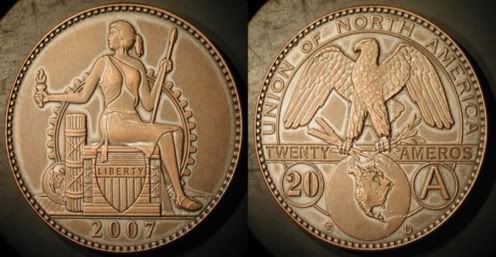Fearing the Amero: The Kazakh Economic Crisis, Common Currency, and Information Deprivation in Almaty



Visiting Almaty the week before last reminded me that it is a resilient city. Its people have lived through many crises, and their will is not easily broken. As a commenter to my previous post on the economic crisis in the country suggested, the people of Kazakhstan will likely be able to muddle through their present hardships as they have many before them. Nonetheless, the signs of economic crisis were definitely visible on my recent quick trip to the country.
The streets of Almaty these days look more like 1999 than 2005. There are still more Porsche Cayennes and Bentleys on the streets than in Washington, DC, but many of the restaurants, bars, and clubs that were once filled with the city’s emerging middle class have been closed, and those that remain have a much sparser clientele than just two years ago. If consumer spending in the United States has slowed substantially, in Almaty, it is closer to a grinding halt. The Mega Mall on Rozybakiyev Street was desolate for a late Saturday morning when I visited it the weekend before last, and the Nike, Reebok, and Clark’s stores were pushing sale prices that rivaled those in the U.S. The arcade, indoor amusement park, and skating rink only attracted a handful of children.
While much of the construction planned for the city’s large financial district off of Al-Farabi Street has been completed, further building in this new ultra-modern part of the city seems to have slowed. Even those glass towers that have been completely finished appear to be housing few clients, making the area feel appropriately like a financial ghost town. Meanwhile, large swaths of Al-Farabi Street remain lined by steel corrugated fences that hide the demolition of old houses while new construction awaits.
Much of the increasingly grim feeling one feels on the streets of Almaty is to be expected given that the global economic crisis and the housing bubble hit Kazakhstan even earlier than it did the US and has yet to hit bottom. Furthermore, the recent “de-valuation” of the Kazakh currency was an act that was immediately felt by the average person in Almaty, causing an abrupt stop to what conspicuous consumerism remained. While the situation on the streets in Almaty feels more desparate than on the streets of DC, sitting with friends in Almaty is much like sitting with friends in Washington. Almost every gathering ends up in a discussion of the economy and, ultimately, with jokes that play on various meanings of “stimulus.” There was one topic of conversation in Almaty, however, that I have never heard in Washington. Ironically, it is a topic that focuses on the United States and the fate of the US dollar.
Numerous people I ran into in Almaty were anxious to ask me about the state of the Amero. If you do not what the Amero is, don’t worry – neither did I. According to people in Almaty, the United States is in the process of scraping the dollar as its currency and converting to a new unified monetary system with Mexico and Canada. Get it? Euro….Amero. This rumor has struck fear into many people who worry about what to do with their dollar savings. Should they sell them to the bank? Into which other currency should they convert these dollars?
While I had not heard of the Amero previously, a quick google search did unearth a plethora of conspiracy theories about the currency emanating from questionable quarters in the American punditry. First, there is a conservative radio talk show host named Hal Turner, who has found a following by fueling anti-immigrant fears of a North American Union and the creation of the common Amero currency (even claiming that we are already shipping this money to China in the video below).
Then, there is the ever-reliable Lou Dobbs, who has brought the conspiracy to prime time via CNN to fuel his peculiar brand of populist American xenophobia. In case you don’t watch Lou Dobbs (which is probably a wise move), you can view his tirades on the Brave New World of the Amero below courtesy of YouTube.
You might still be asking why, if you don’t know about the Amero, is it such a popular theme of discussion in Almaty. First, one must remember that the discontinuation of the Soviet Rubl’ was a watershed in the lives of the people of Kazakhstan who lived through the transition from the USSR to independent Kazakhstan. People still recount how fortunes were made and lost in that currency transition, and everybody wants to be on the winning side if it happens again. Secondly, the people of Kazakhstan and much of the world outside the US, always feel understandably vulnerable in their dependence on American currency. Finally, there is another important thing to mention – Russian television has jumped on the bandwagon, albeit with different motivations than those of Hal Turner and Lou Dobbs (see below).
For the Russians, this is a perfect example of the decline of the American empire. According to their argument, like the great European empires in decline evolving into the European Union, a faltering America is now seeking to join its neighbors in a global financial block that can salvage its worldwide influence. This narrative also opens the door for the Russians to suggest that perhaps the only way for the states of the former Soviet Union to prevent being engulfed by the joint power of the Euro and the Amero (as well as the EU and the mythical North American Union) is to return to the common Rubl’ and a more powerful version of the always fledging CIS.
At the same time, the other big players in the Shanghai Cooperation Organization, Kazakhstan and China, are floating other ideas, besides a Russian-dominated Rubl’ for common currencies that can replace the dollar. Nazerbayev, for example, is promoting the idea of establishing a Eura currency for The Eurasian Economic Community that joins Kazakhstan, Belarus, Russia, Tadjikistan, and Kyrgyzstan. Meanwhile, China is suggesting that the global community should consider an entirely new “super currency” against which all states can convert their money. Thus, while the Amero rumors may seem extreme, they also feed into a general agenda of Russia, China, and Kazakhstan to place the blame for global economic woes on the dollar (an argument that is understandable given the way the Bush administration manipulated and mismanaged the dollar over the previous six years). Furthermore, the Amero scare serves other interests in Kazakhstan and Russia, whether or not intentionally. If people fear the disappearance of the dollar, they may avoid hoarding dollars during the crisis, bringing the currency back into the fledging banking systems of Russia and Kazakhstan.
Thus, while we might see the Amero rumors of Almaty as ridiculous, they make a lot of sense to people living in Kazakhstan. That being said, if you still think the people of Kazakhstan are gullible for fearing the Amero, you must remember the peculiarities of the country’s information terrain. The people of Kazakhstan have little trust in standard information sources, and those sources they tend to believe are sensationalist mouthpieces from Russia. This situation has gotten worse in the last several years as the information arena of Kazakhstan has shrunk. A combination of the consolidation of presidential power, the Rakhat Aliyev scandal, and the economic crisis has driven the government to control information more forcefully than anytime since the arrests of the DVK leaders in 2002.
The once locally produced alternative source of information on television – Channel 31 – has been bought by a Russian media holding and has become an entertainment channel. The monster party of Nur-Otan has co-opted most of the former moderate reformists in the country, including Armandzhan Baitasov, who once ran Channel 31, Nurzhan Subkhanberdin, whose KazKommertz Bank once funded much of the moderate reformist mouthpieces in the country, and Yerlan Karin who was one of those mouthpieces. While opposition newspapers continue to publish, they can be difficult to find and are obscured by new print organs intended to pose as oppositionist. Furthermore, fear of Rakhat Aliyev’s attempts to spread Kompromat about his former in-laws has led to increased cyber attacks on local websites. Sites like kub.kz and geo.kz have all but disappeared, and those alternative sites that remain, such as zona.kz, have become less bold in their publication of information. In short, it is difficult to find anything but “good news” in Kazakhstan these days. In fact, numerous people told me that when the crisis first hit last summer, the local media was told to refrain from using the word “crisis,” a tendency that was in place until very recently.
This is nothing new to Kazakhstan – the restrictions in the flow of information tend to be cyclical in the country, but the present moment is one of “ebb” rather than “flow.” The same, of course, could be said for Russia, but people in Kazakhstan are more likely to believe the slick presentation of information from Russia than they are the increasingly bland local reporting. This makes it quite easy to create a stir about something as tenuous as the rumor of the Amero replacing the dollar.
Like the rumors that spread through Almaty like wildfire in 2005-06 that “The Big Earthquake” was imminent, the rumors of the Amero will likely fade into forgetfulness with time, and few people will have been hurt by the false rumors. The important question, however, is how Kazakhstan will weather its present economic crisis. It has been much harder hit than in 1997-98 when Russia underwent such turbulence. A youthful middle-class once known for ponti (cockiness) has been humbled, and a general uncertainty about the future has returned to the people of the country who were feeling increasingly stable and in control of their destiny.
In all likelihood, Kazakhstan will recover with time given its rich natural resources and its relatively talented business class, but uncertainty about the future may take even more time to disappear. To me the most interesting question is how the present crisis will influence the succession of President Nazarbayev, an event which will determine the country’s future. Although Nazarbayev remains extremely popular, I was told that one poll (not for public consumption) saw his approval ratings drop from the low 90s to the lower 60s. Anything above 60% would be considered fantastic for an American president, but in Kazakhstan it shows a weakness. Given his generally positive influence on the development of independent Kazakhstan, Nazarbayev will inevitably remain in power as long as he decides. Still, he is not immortal, and there will one day be a succession. In Russia, public dissatisfaction with the 1997-98 crisis is often credited with giving Putin the huge mandate he has had for his particular brand of anti-American nationalist populism. If today’s crisis remains strong in the memory of people in Kazakhstan when Nazarbayev leaves the stage, would it lead to the country’s own version of Putinism, or might it lead to increased liberalization? Only time will tell.



5 Comments:
Interesting to see how Amero rumor proliferated in Kaz. Need RFE/Radio Liberty's website http://www.azattyq.org/ to be better promoted and quell such, perhaps.
Question: how did the Bush administration 'manipulate' the dollar over the previous six years? I don't recall interventions on the market, and it was the independent Fed that set/left interest rates too low. 'Mismanage' could be debated, but most commentators I read over the period saw the US as simply giving lip service to "strong dollar" while letting it slide relative to other currencies with benefit of restraining the current account deficit - and (as at least the BusinessWeek economy columnist noted) was noninflationary yet bolstered US exports to the extent that the recession in US was substantially delayed and somewhat compartmentalized.
Anonymous,
Thank you for the comments. In terms of information in Kazakhstan, I would argue, there needs to be satellite TV sources that can help people gain a non-Russo-centric view of the world. Unfortunately, even the best websites will have trouble competing with Russian television when it comes to the information the average person consumes.
Now, on to your question. First of all, I will admit I am not an economist. My interest in economic phenomena are mostly related to their influence on cultural and political processes and their impact on my pocketbook and lifestyle. Thus, if you think my assumptions are misguided, I am all ears.
It was my impression, however, that the Bush administration deliberately deflated the dollar with the intent, as you said, to bolster US exports and perhaps delay recession. Despite what the BusinessWeek columnist wrote, I also think this led to some inflation, at least for consumer goods. Afterall, we cannot really avoid the global economy these days, and a weaker dollar inevitably translates into reduced buying power, at least over the short-term. In this sense, I saw this strategy as fitting in well with the last thirty years of US economic policies that have generally favored making our businesses more competitive at the expense of people's pocketbooks. Now, the truth is that some of that is always needed, but we have also gone overboard too often with the assumption that stronger businesses on the international market will lead to more jobs and more buying power at home, etc. I concede, however, that this opinion is debatable.
Nonetheless, I can say with authority that the weaker dollar during the later years of the Bush presidency affected Americans living abroad (one of whom was me at the time) by reducing their buying power. It also led to a less tangible, but far more important consequence - people around the world (such as people in Kazakhstan) began to lose faith in the dollar. Where I worked at the time, the local staff even lobbied to be paid in local currency instead of in dollars to avoid losing their buying power locally. Others started to convert their savings into Euros. Interestingly enough, the dollar is one of America's strongest sources of public diplomacy in the world. As people lost confidence in the dollar in Kazakhstan, they also began to question the stability, power, etc. of the United States. This history has helped to make the current Amero conspiracy theory in Kazakhstan all the more believable to people.
Not being an economist, I do not know if we really needed to let the dollar slide to soften impending doom (a strategy the Kazakhs also seem to be presently adopting), but its negative affects on the US image abroad (already damaged by Iraq, etc.) leads me to view it as manipulation and mismanagement.
As a true American, and bonafide anglosaxan, I don't trust any currency without the appearance of proper Masonic symbolism. Until the Amearo shows some use of the 33 degree, or at least an all-seeing eye of the Grand Architect, I ain't buyin!
Fascinating reminder of why agenda setting (rather than transparent bias) is the most important effect of media on politics.
In other words: If you don't know what you don't know, how would you know? Answer: you don't.
As for the prospects of the Amero, I am sure it will continue to surface from time to time, especially if the repellent Lou Dobbs has caught the scent of some fresh populist fodder.
As for Almaty, I wonder if anybody ever listens to Radio Free Asia anymore- I know they listen to the Uighur language broadcast in Xinjiang, at least when it is isn't blocked- but is there still a Russian (or even Kazakh?) station that reaches Almaty, and if so, I wonder how big the audience is these days?
If someone is not stuck in Central Asia and do not rock the Uighurs then all would be well
Post a Comment
<< Home